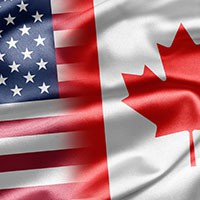Last updated: July 10 2018
Consumer Woes: New Surtax hits Cross-Border Shoppers, While Interest Rates Rise

Canadians spend anywhere from $4.7 to $8 Billion on cross-border shopping and if you spent the July long weekend looking for bargains in the U.S. you may have had an unpleasant surprise: despite the loonie holding some ground against US currency, a new 10% surtax on certain consumer goods came into effective July 1, when if you exceeded your exemption limit.
Last month, Canada was hit with steel and aluminum tariffs by the U.S., which led to a $2 Billion counter-measure from the Canadian government. This month, the Canada Border Services Agency has confirmed that a surtax will apply on certain goods to Canadian citizens who have exceeded their exemption limits; this charge is above and beyond the standard duties already in place.
Each year, Canadian residents take an average of 20 million overnight trips across the border, and it’s these quick visits that will hit your wallet the hardest. After all, there are no duty exemptions if you’ve stayed in the U.S. for less than 24 hours, so this new surtax will apply to all purchases made on such short trips. Make sure you’re familiar with the exemption limits for U.S. stays between 24 and 48 hours, and over 48 hours, so you know when standard duties and this new surtax apply.
The 10 percent surtax is being levied by the U.S. government on the value of the applicable duty on any items classified as steel or aluminum products, as well as on a classification referred to as “Other Goods.” This category covers a wide range of things, including coffee, yogurt, candy, household and cleaning products, some types of alcohol, appliances and electronics. Outdoor enthusiasts will be hit, too: the new surtax applies to various types of pleasure boats, sail boats, sleeping bags, mattresses and more. Even your playing cards used around the campfire will cost more if they are made in the U.S.! A complete list of applicable items is available on the Department of Finance website.
Meanwhile, there is more bad news for consumers. Even if you’re planning to focus on buying homegrown Canadian products, it is widely expected that interest rates will rise in Canada July 12. That won’t help the millions of Canadians who hold a share of the $2 Trillion in consumer debt. According to a survey by Reuters, July 4-6, 19 out of 25 economists have predicted the Bank of Canada will raise rates to 1.50 percent.
“This is a time for Canadians to speak to their tax and financial advisors about their portfolios and, more specifically, about their family’s real net worth positions – after taxes, inflation and fees including interest costs,” says Evelyn Jacks, President of Knowledge Bureau. “Working with an advisor trained in the discipline of Real Wealth Management™ can help fill the tax-efficiency gaps, which will be harder to save for if debt levels are not properly managed. We are also pleased to cover U.S.–Canada tax and trade issues in detail at the Distinguished Advisor Conference, November 10-14 in Quebec City this year. This new knowledge is critical for advisors from across the financial services.”
Additional educational resources:
Looking for resources to help guide your clients’ financially sound decisions in areas like these? Knowledge Bureau’s Debt and Cash Flow Management course and the Real Wealth Management program can help. While you’re at it, increase your knowledge of cross-border taxation issues with Knowledge Bureau’s certificate course in this specialized area of tax law, either by enrolling in the certificate course offered (a free trial is available!), or registering to attend this year’s Distinguished Advisor Conference.
At this year’s DAC, economist Dr. Jack Mintz and other U.S. tax experts, including Dean Smith of Cadesky Tax, will be addressing the implications of U.S. policy on Canada’s competitiveness, and the tax consequences affecting Canadians. Click here to see the full agenda. Early registration ends September 15.
COPYRIGHT OWNED BY KNOWLEDGE BUREAU INC. 2018.
UNAUTHORIZED REPRODUCTION, IN WHOLE OR IN PART, IS PROHIBITED.





